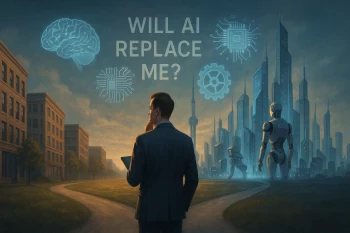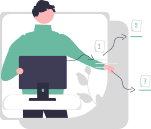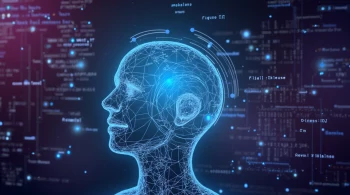In an era where artificial intelligence seems to be advancing at breakneck speed, a question lurks in the minds of professionals across industries: "Will AI replace me?" This concern isn't just academic—it's deeply personal, touching on our livelihoods, identities, and sense of purpose. While headlines often oscillate between dystopian warnings and utopian promises, the reality of AI's impact on careers is far more nuanced and warrants thoughtful exploration.
Understanding the AI Capability Spectrum
To assess whether AI might replace your role, it's crucial to understand what AI can and cannot do effectively. Current AI systems excel at specific capabilities while struggling with others:
AI's Current Strengths
- Pattern recognition: Identifying regularities in vast datasets
- Routine task automation: Executing well-defined, repetitive processes
- Natural language processing: Understanding and generating human language
- Prediction based on historical data: Making forecasts using past trends
- Content generation: Creating text, images, and audio based on patterns
AI's Current Limitations
- Emotional intelligence: Genuinely understanding human emotions and responding appropriately
- Contextual awareness: Fully grasping situational nuances beyond pattern matching
- Original ideation: Creating truly novel ideas rather than recombining existing concepts
- Ethical judgment: Making complex value-based decisions with moral understanding
- Adaptability to unprecedented situations: Responding effectively to completely new scenarios
"AI is incredibly powerful at scaling what we already know how to do," explains Dr. Melissa Chen, AI Research Director at the Institute for Technology and Work. "What it can't do is determine what we should do in the first place—the uniquely human ability to set meaningful goals based on values and context."
The Transformation Continuum: Which Roles Are Changing?
Rather than a simple binary of "replaced" versus "safe," careers exist on a continuum of transformation. Understanding where your role falls can help you prepare appropriately:
High Transformation Potential
Roles centered around predictable, rule-based tasks with limited need for human connection face significant disruption:
- Data entry specialists: AI can process and input structured information with greater speed and accuracy
- Basic accounting functions: Routine bookkeeping and transaction processing are increasingly automated
- Simple content creation: AI can generate standardized reports, articles, and basic visuals
- Routine customer service: Chatbots now handle common inquiries and basic troubleshooting
- Process-driven quality control: Visual inspection and standardized testing being automated
James Wilson, who worked in insurance claims processing for 15 years, experienced this shift firsthand. "Five years ago, I'd process about 40 claims daily. Today, our AI system handles over 200 straightforward claims, while our team focuses on complex cases requiring judgment and customer sensitivity."
Moderate Transformation
Many roles won't disappear but are being significantly redefined as AI handles specific aspects:
- Legal professionals: While AI manages document review and precedent research, lawyers focus on strategy, client relationships, and courtroom advocacy
- Financial advisors: Algorithms generate investment options, but advisors provide behavioral coaching and personalized context
- Medical diagnosticians: AI flags patterns in scans and lab results, while doctors integrate findings with patient history and unique circumstances
- Creative professionals: AI generates initial drafts and variations, while humans provide creative direction, emotional resonance, and cultural relevance
- Middle management: Data-driven decision making is automated, shifting focus to team development and strategic implementation
Lower Transformation Potential
Some roles remain centered on distinctly human capabilities that AI struggles to replicate:
- Mental health counselors: Requiring deep emotional intelligence and authentic human connection
- Strategic leadership: Setting organizational direction based on complex value judgments and stakeholder needs
- Cross-cultural negotiation: Navigating subtle cultural nuances and building genuine trust
- Innovative research: Defining truly novel problems worth solving and connecting disparate domains
- Education and mentorship: Inspiring and adapting to individual learning needs with empathy
Beyond Replacement: AI as Augmentation
For many professionals, the question isn't whether AI will replace them, but how it will transform their work—often by handling routine aspects so humans can focus on higher-value contributions.
"The narrative of replacement misses the most likely outcome," argues Thomas Davenport, Professor of Information Technology at Babson College. "Throughout history, automation has changed jobs more often than it's eliminated them. The key is understanding how your role will evolve with AI as a partner rather than a replacement."
This partnership model is already emerging across sectors:
Healthcare
Radiologists now use AI to pre-screen images, highlighting potential areas of concern. This doesn't eliminate the need for radiologists but allows them to focus their expertise on the most critical analyses and patient care.
Legal Services
Law firms increasingly employ AI for document review and basic research, enabling attorneys to devote more time to case strategy, client counseling, and courtroom advocacy—the aspects clients value most.
Customer Service
Rather than replacing service representatives, many organizations use AI to handle routine inquiries and prepare information for more complex cases, allowing human agents to focus on high-value, emotionally complex interactions.
Adapting to the AI Era: Practical Strategies
Rather than passively wondering "Will AI replace me?", professionals can take proactive steps to thrive in a changing landscape:
1. Conduct an AI Impact Assessment
Evaluate your role through these questions:
- Which aspects of your work involve repetitive processes or pattern recognition?
- What parts require uniquely human skills like emotional intelligence or ethical judgment?
- How might AI handle routine aspects, freeing you to focus on higher-value tasks?
2. Develop Complementary Skills
Focus on capabilities that complement rather than compete with AI:
- Human connection: Empathy, emotional intelligence, relationship building
- Creative problem-solving: Identifying novel approaches to unprecedented challenges
- Ethical reasoning: Making nuanced value judgments in complex situations
- Interdisciplinary thinking: Connecting insights across domains AI might treat separately
- Strategic vision: Defining meaningful goals and values beyond optimization
3. Become AI-Conversant
Learn enough about AI to effectively collaborate with these systems:
- Understand basic AI concepts and limitations
- Develop prompt engineering skills to effectively direct AI tools
- Learn to evaluate AI outputs critically
- Identify opportunities to integrate AI into your workflow
"The professionals who will thrive aren't those who resist AI or passively accept displacement," notes career strategist Elena Rodriguez. "They're the ones who become skilled AI conductors—knowing when to use it, how to direct it, and when human judgment should prevail."
4. Focus on Transferable Meta-Skills
Cultivate capabilities valuable across domains and resilient to technological change:
- Learning agility: The ability to acquire new skills quickly
- Critical thinking: Evaluating information and arguments systematically
- Communication: Articulating complex ideas clearly and persuasively
- Collaboration: Working effectively with diverse teams, including AI systems
- Adaptability: Navigating change with resilience and flexibility
Industry-Specific Outlook
The AI impact varies significantly across sectors, with some facing more dramatic transformation than others:
Finance and Banking
High transformation areas: Transaction processing, basic analysis, routine compliance monitoring Growing opportunities: Client relationship management, complex risk assessment, ethical oversight, financial coaching
Healthcare
High transformation areas: Initial diagnostics, administrative documentation, appointment scheduling Growing opportunities: Complex case management, empathetic care delivery, treatment customization, health coaching
Legal Services
High transformation areas: Document review, legal research, contract analysis, basic drafting Growing opportunities: Strategic counsel, negotiation, client relationships, courtroom advocacy, ethical judgment
Creative Industries
High transformation areas: Basic content creation, production assistance, initial designs Growing opportunities: Creative direction, emotional storytelling, cultural innovation, authentic expression
Education
High transformation areas: Content delivery, basic assessment, administrative tasks Growing opportunities: Mentorship, adaptive teaching, social-emotional development, critical thinking facilitation
Embracing the Human Advantage
As we navigate anxieties about AI replacement, it's worth reflecting on what makes us uniquely valuable as humans. Rather than competing with AI on its terms—speed, scalability, and pattern recognition—we can lean into our distinctive strengths:
- Purpose and meaning-making: Defining what matters and why
- Ethical reasoning: Making value-based judgments in ambiguous situations
- Genuine connection: Creating authentic relationships built on empathy
- Creative vision: Imagining truly novel possibilities beyond existing patterns
- Contextual wisdom: Integrating knowledge with nuanced real-world understanding
"Throughout history, technology has consistently eliminated certain tasks while creating new opportunities," reflects Dr. Michael Johnson, historian of technology at Stanford University. "What changes is the nature of human contribution. The industrial revolution shifted us from physical to cognitive labor. The AI revolution is pushing us toward more distinctly human forms of cognition—creativity, wisdom, connection, and purpose."
Conclusion: Partners Rather Than Replacements
The question "Will AI replace me?" ultimately misframes our relationship with technology. Throughout human history, tools have extended our capabilities rather than simply substituting for them. AI represents a powerful new class of tools that will indeed transform work—but most likely as a partner rather than a replacement.
For most professionals, the future lies not in resistance to AI nor in passive acceptance of displacement, but in thoughtful integration. By understanding AI's capabilities and limitations, developing complementary human strengths, and remaining adaptable, we can shape technological change rather than merely responding to it.
In this emerging partnership, AI handles routine, pattern-based aspects of work, while humans focus on the meaningful, creative, and ethical dimensions. The question then evolves from "Will AI replace me?" to the more empowering "How can I work with AI to create more value than either of us could alone?"




